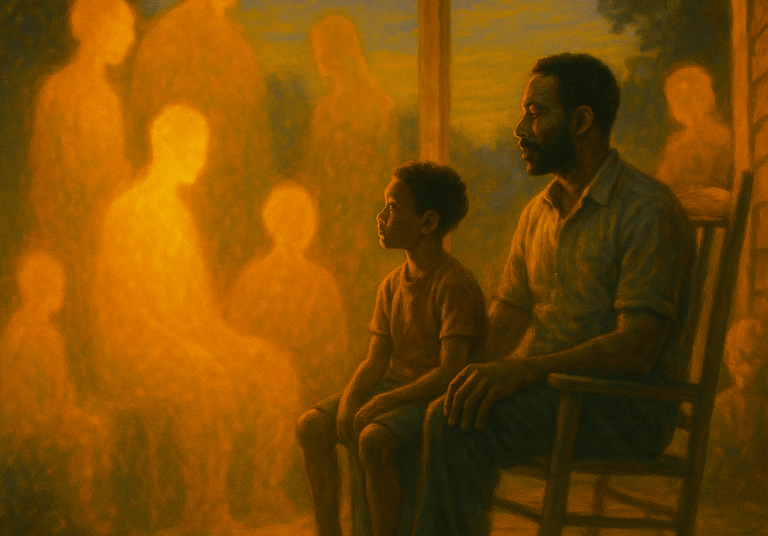The Man Who Raised Ghost
A magical realism short story about a boy who learns to summon ancestral spirits through stories passed down by his father. A meditation on memory, legacy, and what it means to keep the past alive.
Hank Amon
6/23/20257 min read


“Some people think ghosts are about death, Elijah. But this—what we do—is about life.”
The Man Who Raised Ghosts
The first time I saw my father summon a ghost, I was seven years old.
It was a Tuesday evening in late June—the kind where summer heat lingers long past dinner, turning the air thick and golden. We sat on the back porch of our small house on Maple Street, my legs swinging from a chair still too tall for my feet to touch the ground.
"Ready for a story, Elijah?" he asked, his voice low and melodic in the gathering dusk.
I nodded eagerly. My father's stories were legendary in our neighborhood—not the kind from books, but tales he seemed to pull from the air itself, populated with characters so vivid they left impressions like real people.
He closed his eyes, large hands resting on his knees. When he opened them again, something had shifted—his gaze stretched past the yard, as if he were seeing a world just out of reach.
"Tonight," he said, "I want to tell you about my grandfather, your great-grandfather Solomon."
I had never heard him mention this man before. My father rarely spoke of Georgia, where he grew up.
"Solomon was born into slavery," my father said, his voice taking on a rhythm I’d never heard, "but he carried freedom in his heart long before it touched his body."
As he spoke—describing Solomon’s hands, “wide as shovels but gentle enough to coax seeds into growing”—the air beside him shimmered. It looked like heat rising from pavement. And then, seated beside him, not quite solid but undeniably real, was an old man whose eyes held sorrow and mischief in equal measure.
I gasped, but stayed silent, afraid to break the spell.
"Solomon knew every plant in the woods," my father said. "Which could heal, which could harm, which could show you things others refused to see."
The ghost nodded faintly.
"When freedom came, he walked three days to find his wife. No map, no letters. Just the trees telling him where to go."
The ghost smiled, revealing a gap between his teeth. He lifted his hands as if brushing invisible branches aside.
That night began my education in ghost-raising. I didn’t understand then that what my father practiced wasn’t about conjuring spirits—it was about refusing to let them fade.
By twelve, I had met dozens of ancestors through his stories: Great-aunt Bessie, founder of a colored women’s literary society; Uncle Marcus, whose trumpet made white-only clubs sneak him through back doors; Cousin Delia, who predicted the great flood of ’27.
The process always followed a rhythm. My father would close his eyes, breathe deep, and begin weaving stories into the present tense. As his words gathered weight, the air thickened, and they would appear—never solid, but vivid enough that I saw calluses on fingers, patterns on dresses, emotions flickering across ghostly faces.
"What you’re seeing," he told me once, "is memory made visible. Our people have always known remembering is sacred. If we speak their names with love and truth, they live again."
"Can anyone do it?" I asked.
"Anyone who listens more than they speak. Anyone who knows they’re not just themselves, but everyone who came before too."
He paused. "Some people think ghosts are about death, Elijah. But this? This is about life. About keeping what matters from being lost."
When I was fifteen, everything changed.
My mother had left. We were in a cramped apartment now, and my father worked two jobs that wore him raw. His stories grew infrequent. When they came, they stuttered—his voice uncertain, the apparitions dim.
One night, he tried to summon a cousin who'd once appeared easily: a woman in blue with a voice like windchimes. This time, she flickered and never fully formed.
"I'm losing them," he said, staring at his hands. "Every time I try, they come back weaker."
"You're just tired," I offered.
He shook his head. "It’s more than that. My grandmother could raise ghosts five generations back. My father, three. Me? Barely two now."
A beat of silence passed.
"What happens when no one remembers?" I asked.
He looked at me, and for the first time, I saw fear etched into his face.
"Then those stories die. And when a story dies, something of us dies with it."
That night, I decided: if my father was losing his gift, I would have to learn it myself.
But ghost-raising didn’t come easily.
For months I practiced in secret, trying to summon the ancestors my father had shown me. I closed my eyes. Repeated names. Whispered their stories. But the air remained still, heavy with silence.
"You’re forcing it," my father said when he caught me. "Ghost-raising isn’t about will. It’s about space. You invite them in—you don’t drag them out."
"But how?"
"Start with someone you knew in your bones. Someone who left a mark on your skin."
That night, we sat on the balcony. Rain teased the air.
"Think of Grandma Iris," he said.
She had died when I was four, but I remembered the scent of rosewater. The soft hum of her voice. Her warm hands cupping my face.
"Don’t picture her,” he said. “Remember what it felt like to be loved by her.”
I did.
And suddenly, the air bent around us. Like the moment before a storm breaks. When I opened my eyes, she was there—blurred, like watercolor left in the rain—but her smile crinkled just the way I remembered.
"Grandma," I whispered.
My father placed a trembling hand on my shoulder.
"You’ve got it," he said. "You just need practice."
By the time I finished high school, I could raise ghosts as well as he once had. We created a living archive of our family’s past, taking turns every Sunday.
But then something shifted.
One night, I saw a flicker around the edges of a summoning—a form that didn’t belong to any ancestor I knew. A whisper I couldn’t place. And weeks later, I called forth a young woman neither of us had ever met.
She wore an early 20th-century dress and stood tall with defiant eyes.
"Who is she?" my father asked, breath catching.
I watched him go still. His storytelling hands—always in motion—lay flat against his knees.
"Her name is Harriet," I said, the knowledge arriving whole. "She was one of the first Black women to graduate from medical school in Chicago. She fought for every inch."
My father blinked. "I never heard about her..."
"He hadn’t known," I realized. "He hadn’t known."
"There are voices," I said slowly, "that have been waiting a long time to be heard. I think... I think they’re speaking through me now."
As I spoke, I heard it faintly—a whisper at the edge of thought. “They wouldn’t listen.”
The ghost of Harriet stood straighter, pride etched into her face.
That was the day I understood: ghost-raising wasn’t just about preservation. It was about recovery. About reaching for what was silenced.
The summer after my first year of college, my father was diagnosed with early-onset Alzheimer’s.
He forgot the name of my childhood dog. Sometimes, he thought I was his brother.
The cruel irony—of a man who lived to preserve memory now losing his own—settled between us. But we never spoke of it aloud.
Instead, we raised ghosts.
Sometimes, after summoning an ancestor, he would grow sharper—his eyes clearer, voice firmer. As if the act of remembering them helped him remember himself.
"We don’t have much time," he said one lucid afternoon. "There’s still so much I haven’t shown you."
So we worked. Every spare moment. He would summon. I would learn. Together, we called up elders and outcasts, visionaries and saints. And sometimes, when he faltered, they answered him.
"The ghosts remember," he whispered. "Even when we forget. That’s why this work matters."
When he entered the nursing home, he couldn’t summon anymore. Some days, he didn’t know my name.
But every Sunday, I visited.
I’d sit beside his bed, close my eyes, and raise the ghosts. I watched how, when they appeared, his hands would twitch. His breath would steady. Sometimes, a flicker of light would pass through his gaze.
The staff thought I was telling stories to comfort him. But I knew better. They were still reaching him.
One evening, I summoned Solomon again—the first ghost he had ever raised.
“Do you remember him?” I asked gently.
My father blinked. Then nodded.
“He taught me,” he whispered.
“Taught you what?”
“How to keep them alive.”
His gaze shifted toward Solomon.
“How to make sure nothing important is lost.”
He died on a Tuesday evening in late June. The kind where summer heat lingers past dinner, turning the air thick and golden.
I was holding his hand.
That night, I sat alone on my balcony, the way we once had. I closed my eyes, not to remember facts or figures—but how it felt to be loved by him. His quiet strength. His unwavering faith in me.
The air thickened.
When I opened my eyes, he was there. Not as clear as he would become with practice, but unmistakably him—young, whole, his smile tinged with pride.
"You raised me," I said, tears falling.
He nodded.
"I’ll keep them all alive," I promised. "Your stories too."
He didn’t speak. He didn’t need to.
Because I understood now: we are never just ourselves. We are every story we carry. Every voice we've listened for. Every truth we've chosen to remember.
And one day, when I have children of my own, I’ll teach them to raise ghosts too. I’ll start with their grandfather. And through him, I’ll show them how love lives on.
Not in flesh.
But in memory made visible.
Reflection:
Some stories don’t fade. They wait—quietly—until someone listens close enough to bring them back into the light.
Who raised the ghosts for you?
Whose stories are waiting in the quiet corners of your memory, asking to be remembered?
If this story moved you, share it with someone whose story deserves to be heard. And if you’re building your own legacy, keep telling it. Again and again. Until it lives.
Hear more Echos
Credit & copywrites
Hosted by: Hostinger
Designed by: E-Zay designs
© 2024 Elevated Echo, All rights reserved.
contact
